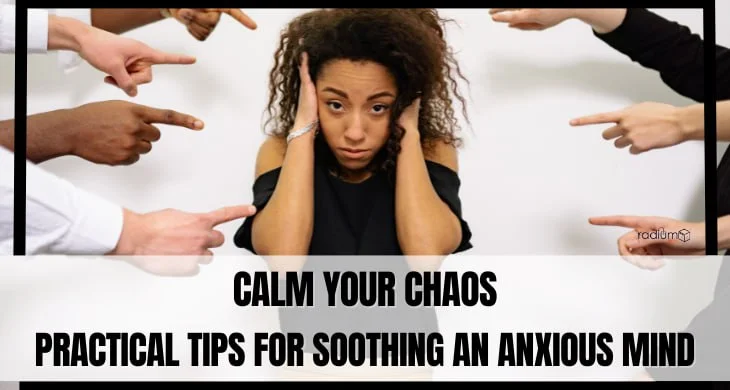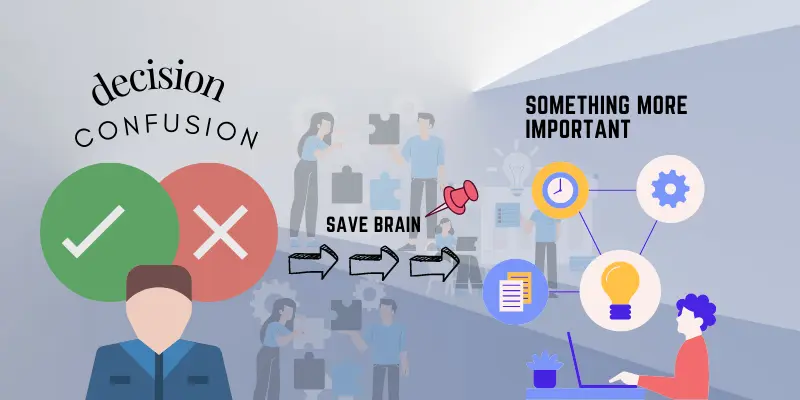If you’ve ever felt anxious, you understand the overwhelming sensation it brings. From racing thoughts to a pounding heart, anxiety can completely take over, leaving you feeling frazzled and out of control. But there are ways to reclaim your peace of mind and find tranquility amid the chaos. In this blog, we’ll delve into some effective strategies to calm your anxious mind and enhance your overall well-being. By incorporating these simple yet powerful techniques into your daily routine, you can regain control over your thoughts and emotions, paving the way for a more serene and balanced life.
Understanding the Importance of Calming Your Anxious Mind
Calming an anxious mind goes beyond just feeling better momentarily; it’s vital for your overall health and mental well-being. When stress and anxiety levels soar, they can wreak havoc on both your body and mind, causing problems like trouble sleeping, difficulty concentrating, and mood swings. By mastering techniques to soothe your anxious mind, you can make significant improvements in various aspects of your life. Better sleep quality, sharper focus, and a more stable mood are just some of the benefits you can enjoy. Learning how to calm your anxious mind isn’t about eliminating stress altogether but rather about managing it effectively. By incorporating simple relaxation practices into your daily routine, like deep breathing or mindfulness exercises, you can gradually build resilience against anxiety’s grip. Taking proactive steps to calm your mind not only helps you navigate the ups and downs of daily life more smoothly but also lays the foundation for long-term mental and emotional well-being.
Harnessing the Power of Relaxation Techniques
One of the most reliable methods to ease an anxious mind is by embracing relaxation techniques. Practices like deep breathing exercises, mindfulness meditation, and progressive muscle relaxation serve as potent tools in calming anxiety and fostering inner tranquility. These methods function by triggering the body’s relaxation response, a natural mechanism that counters the stress response, thus reinstating equilibrium to both the mind and body.
Deep breathing exercises involve taking slow, deliberate breaths, focusing on the sensation of air entering and leaving the body. This rhythmic breathing pattern helps regulate the autonomic nervous system, reducing feelings of tension and anxiety. Similarly, mindfulness meditation encourages present-moment awareness, allowing individuals to observe their thoughts and emotions without judgment. By cultivating a non-reactive mindset, mindfulness helps diminish the power of anxious thoughts and promotes a sense of calm.
Progressive muscle relaxation entails systematically tensing and releasing muscle groups throughout the body. This practice helps alleviate physical tension and promotes a sense of relaxation in both body and mind. You can overcome anxiety’s hold on you and foster a stronger sense of calm and well-being by adopting these relaxation techniques into your everyday routine. You can improve your general quality of life by teaching your body and mind to react to stimuli more calmly with regular practice.
Deep Breathing Exercises
Breathing techniques that are deep provide a simple yet powerful way to reduce anxiety right now. You can calm your mind and trigger your body’s relaxation response by focusing on taking slow, deep breaths. The first step in practicing deep breathing is to get into a comfortable sitting or sleeping position. After that, take a deep breath through your nose, expanding your abdomen as you fill your lungs with air. To help your body’s oxygen to circulate, hold your breath for four counts. Next, gently and steadily expel the breath through your lips, allowing your abdomen to contract as you do so. Iterate through this procedure multiple times, paying attention to the cadence of your breathing and the wave of calm that courses through your body.
Deep breathing exercises are effective because they engage the parasympathetic nervous system, which is responsible for promoting relaxation and reducing stress. By deliberately slowing down your breathing and extending the exhalation phase, you signal to your body that it is safe to relax. This helps counteract the physiological symptoms of anxiety, such as rapid heart rate and shallow breathing, while also quieting the mind and promoting a sense of inner calm.
Incorporating deep breathing exercises into your daily routine can be beneficial for managing anxiety and enhancing overall well-being. Whether practiced as a standalone technique or integrated into mindfulness meditation sessions, deep breathing offers a portable and accessible tool for finding relief from stress and anxiety whenever you need it.
Mindfulness Meditation
Mindfulness meditation is a practice that encourages us to be fully present in the moment, without judgment or distraction. It involves intentionally directing our attention to our breath, bodily sensations, or the environment around us, allowing us to cultivate a greater sense of awareness and clarity. By observing our thoughts and feelings without getting caught up in them, we can develop a more balanced perspective and reduce the impact of anxiety on our mental and emotional well-being.
To practice mindfulness meditation, find a quiet and comfortable space where you won’t be disturbed. Sit or lie down in a relaxed position, and close your eyes if that feels comfortable for you. Begin by bringing your attention to your breath, noticing the sensation of each inhale and exhale. You may also choose to focus on a specific anchor point, such as the feeling of your feet on the ground or the sounds in your environment.
As you continue to meditate, you may notice that your mind begins to wander, and that’s okay. Instead of trying to suppress or control your thoughts, simply acknowledge them without judgment and gently guide your focus back to your chosen point of attention. With practice, you’ll find that your ability to remain present and centered improves, allowing you to experience greater peace and calm even in the midst of challenging circumstances.
Making mindfulness meditation a regular part of your routine can have profound benefits for your mental and emotional well-being. By dedicating just a few minutes each day to quiet reflection and introspection, you can cultivate a greater sense of resilience and inner peace that can help you navigate with more ease and clarity face life’s ups and downs.
Progressive Muscle Relaxation
Progressive muscle relaxation is a simple yet effective technique for reducing muscle tension and promoting relaxation. It involves systematically tensing and then relaxing different muscle groups in the body to release physical tension and promote a sense of calm.
To practice progressive muscle relaxation, find a quiet and comfortable space where you can lie down or sit in a relaxed position. Begin by focusing on your breathing, taking slow, deep breaths to help calm your mind and body. Then, starting with your feet, tense the muscles in each area of your body for about 5-10 seconds, paying attention to the sensations of tension.
After tensing each muscle group, release the tension slowly and completely, allowing the muscles to relax fully. As you release the tension, focus on the sensation of relaxation spreading through your body, from your feet all the way up to your head.
Continue this process, moving systematically through each muscle group in your body, including your legs, abdomen, chest, arms, and neck. Take your time with each muscle group, allowing yourself to fully experience the sensation of relaxation as you release the tension.
Progressive muscle relaxation can be a valuable tool for managing stress and anxiety, promoting relaxation, and improving overall well-being. With regular practice, you can learn to recognize and release tension in your body, helping you to feel more relaxed and at ease in your daily life.
Cultivating Resilience and Inner Peace
In addition to relaxation techniques, building resilience and inner peace is key for managing stress and anxiety over time. This means developing a mindset of acceptance, self-kindness, and adaptability when facing life’s hurdles. By embracing a positive and flexible attitude, you can strengthen your ability to handle tough situations with more confidence and composure.
Cultivating resilience involves accepting that challenges and setbacks are a natural part of life and viewing them as opportunities for growth rather than insurmountable obstacles. It also means practicing self-compassion by being gentle and understanding with yourself during difficult times, rather than being self-critical or judgmental.
Flexibility is another crucial aspect of resilience, as it allows you to adapt to changing circumstances and find creative solutions to problems. Instead of getting stuck in rigid thinking patterns or dwelling on past mistakes, try to stay open-minded and flexible in your approach to life’s challenges.
Building resilience and inner peace takes time and practice, but it can have profound effects on your overall well-being and mental health. By cultivating these qualities, you can develop greater emotional strength, enhance your ability to bounce back from adversity, and find more peace and contentment in your life.
Conclusion
Quieting an anxious mind is vital for boosting your overall wellness and mental health. Through practicing relaxation methods and fostering resilience and inner tranquility, you can calm anxiety, alleviate stress, and bolster your capacity to handle life’s challenges. It’s important to be kind and patient with yourself as you embark on this journey, recognizing that progress takes time. If you find yourself struggling, don’t hesitate to reach out for support from a mental health professional. Remember, you have the strength within you to navigate through moments of anxiety and emerge with greater peace and resilience. Keep prioritizing your well-being and know that each step you take towards calming your mind brings you closer to a more balanced and fulfilling life.
Frequently Asked Questions
Ques. How often should I practice relaxation techniques?
Ans. Aim to practice relaxation techniques for at least a few minutes each day to reap the benefits.
Ques. Can relaxation techniques help with insomnia?
Ans. Yes, relaxation techniques can help promote better sleep quality and alleviate insomnia symptoms.
Ques. Are there other ways to calm an anxious mind besides relaxation techniques?
Ans. Yes, activities like exercise, spending time in nature, and engaging in hobbies can also help reduce anxiety levels.
Ques. How long does it take to see results from relaxation techniques?
Ans. Some people may experience immediate relief from anxiety after practicing relaxation techniques, while for others, it may take time to see significant results.
Ques. Should I consult a doctor before trying relaxation techniques?
Ans. If you have any underlying health conditions or concerns, it’s always a good idea to consult with a healthcare professional before starting a new relaxation practice.




